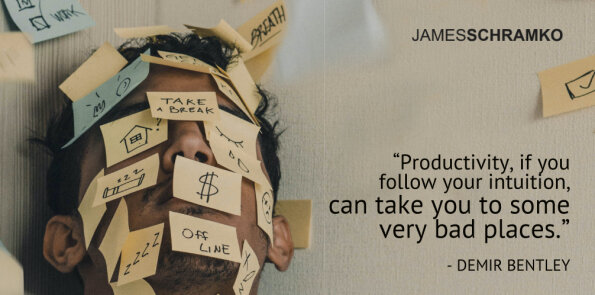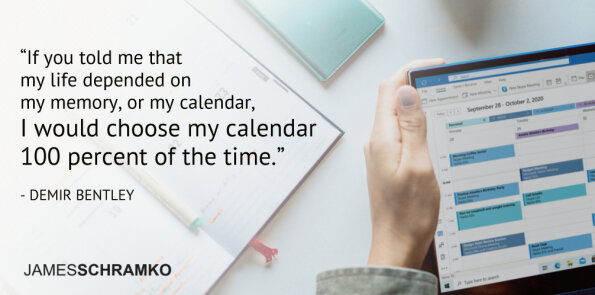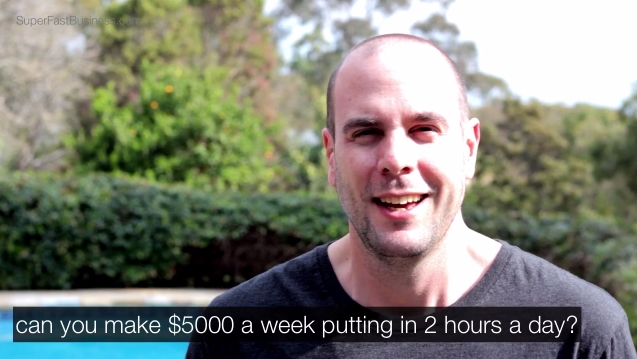Podcast: Download (Duration: 48:27 — 48.1MB)
Get Notified Of Future Episodes Apple Podcasts | Spotify | Amazon Music | Android | Blubrry | Gaana | TuneIn | Deezer | Anghami | RSS | More
Winning the Week is Demir and Carey Bentley’s answer to the impossible task of trying to win each day in terms of productivity.
In this podcast episode, Demir and James discuss how the productivity space has changed since generations past.
You’ll discover that learning how to plan a week is the seemingly obvious but much neglected key to being productive.
And you’ll learn the five steps the Bentleys have devised for effectively planning weekly goals and schedules.
Table of contents
1. Productivity from a generational standpoint
2. From workaholism to a balanced lifestyle
3. The smallest lesson with the biggest result
4. What sports and productivity have in common
5. If you’re not intuitively productive…
6. Planning your week – isn’t it obvious?
-
a.Removing the resistance to planning
b. Determining your number one priority
c. Interrogating your calendar
d. Time to triage your tasks
e. You know what to do – now when do you do them?
7. What you can learn in hindsight
8. A guard against time blindness
9. When you’re the best source of information
10. The lifestyle factor
11. Would you trade places with this person?
Productivity from a generational standpoint
Demir has clients in their mid-70s, and he’s gone to them for perspective on what he calls the productivity problem.
A lot of his clients feel overworked, he says. Has it always been hard, and is this generation just wimpy?
No, they assure him, things have gotten harder. Aside from increasing expectations at work, people expect more of themselves as human beings.
Our great grandparents did not struggle with personal development and enlightenment goals, while striving to excel as spouse and father and being a trailblazer at work.
And previous generations didn’t have technology interfering with their lives, says James. Life was simpler – bread and milk appeared at the door; people went to work, came home, listened to the wireless, and went to bed.
And that’s why the Bentleys’ mission is to help people become the most productive, organized version of themselves, allowing them to create the life that they really want to be living. And as an extension of that, they aim to break the chain of productivity problems so their kids will have a more positive relationship to work and success.
From workaholism to a balanced lifestyle
James and Demir have lived both sides. Demir was a New York workaholic, grinding all day and coming home to a glass of wine, and feeling all the while like he was losing each week.
James worked essentially a seven-day-a-week job and was proud of his work ethic, till he realized he did not want to toil till he was 65, then sit around suddenly doing nothing.
For Demir, it was a heart attack that signaled something needed to change. Now he tells clients, Let me be your heart attack; let me be the slap across the face that tells you there’s a different way to live.
It’s a common narrative, says James. He coached Ryan Levesque, who ventured online due to health issues, and he himself was told, If you keep this up, you’re going to kill yourself.
After James escaped his job, he wrote Work Less, Make More, and read all the classics on productivity. Among his show guests he’s had Jay Papasan of The ONE Thing and Systemology’s Dave Jenyns.
The smallest lesson with the biggest result
The ONE Thing is a productivity bible, says Demir.
James is curious to know what approach the Bentleys came up with to productivity.
Demir and Carey took a clinician’s approach, says Demir, looking to integrate ideas into people’s lives to achieve a benefit. They felt they had what was missing from the productivity space.
An analogy would be a bicycle shop owner who shows a customer a bin full of parts – everything they need is there, but they have to put it together.
In the same way, the productivity space was full of powerful but disconnected ideas. Demir and Carey have coached over 50,000 people, taking those ideas and putting them together to make them work.
To do this, the Bentleys thought, what’s the least we could coach somebody on that would change their life forever? If someone only read their book, what was the smallest thing that would have the biggest result?
They decided it was their Winning the Week Method, the premise being that you needn’t win every day in terms of productivity. If you lose a day or two, you can still win the week.
What sports and productivity have in common
It’s like baseball, says Demir – you can lose two or three innings and still win the game. This mindset allows a much more humane approach to productivity, while still achieving the goals you target.
If you’re playing life like a sport, who’s the loser, asks James?
There doesn’t have to be a competition, says Demir. What he likes about the sports analogy is, in sports as opposed to war, you can play a lot of games, and you can even lose and learn from your losses.
You can develop, you can integrate, you can level up and go from playing high school to college to pro baseball. In sports as well, there’s a common understanding that you’ll have coaching, and that you won’t be doing it all by yourself, that you’ll have a team of people that’s supporting you.
And it can help us realize, says Demir, that we are the star player in our game. So many people treat themselves in such a stingy way – they’re stingy with resources, stingy with self-love, stingy with rest and recovery; they’re stingy with coaching, stingy with investing into improving themselves.
You really want to treat yourself like the Serena Williams of your life, Demir says, the big star.
You want to surround yourself with support. You recognize that, yeah, there’s limited resources, but you want to try to surround yourself with all the resources to win.
If you’re not intuitively productive…
James doesn’t have a weekly planning session as Demir’s book recommends, but there are some commonalities between his system and that of Demir.
So when he opens up a week, his appointments are already set for him. He’s automated what could be a manual planning process, so that, say, recording a podcast has been pre-scheduled before the day rolls around.
Then he blocks things so there’s no encroaching on his days off, and so forth.
What Demir has found about truly successful people is that they usually, through trial and error or intuition, have applied the techniques he speaks of in his book, without making them explicit.
So what Demir is trying to do for people like himself who aren’t intuitively productive is to break down those techniques into principles that somebody can follow. Because productivity, he says, if you follow your intuition, can take you to some very bad places.
Planning your week – isn’t it obvious?
Again, when Demir and his wife Carey wrote their book, they were looking for the smallest thing they could teach that would have the greatest impact. They determined that of all productivity life hacks, really the smallest, most important thing that you can do to win your week is planning weekly.
They surveyed 5000 people in management who said that planning the week was one of the most important techniques to win it. It seemed obvious.
But then they went back to those 5000 people and asked if they had actually been planning their week for the last four weeks. Less than one percent had a four-week streak.
So besides getting people to plan their week, the Bentleys decided to make it easier and relatively painless, by showing people how to plan a week in 30 minutes or less, using just five steps. And they actually have weekly Zoom calls with their 2000-strong community to plan out their weeks in half an hour.
Removing the resistance to planning
Step one of the planning process is removing resistance, because many of us may have had bad experiences with planning. And planning is often accelerating the most anxious parts of one’s week to the fore, to consider and deal with them.
So first thing is to recognize where resistance comes from, and create an environment where you actually want to plan.
Determining your number one priority
Number two is to choose your number one priority, and this is simply a copy paste from Jay Papasan. What is the most leveraged thing that can make everything else in your life easier or unnecessary?
This one thing comes before all other things and will give you radical clarity to start off your planning.
Interrogating your calendar
Then there’s what Demir calls a calendar interrogation. And this is different from a simple review.
An interrogation means coming at your calendar from different angles, determining the truth of your time supply. Because there are things that should be on your calendar that aren’t, and there are things that are on your calendar that shouldn’t be.
Once you’ve done that thoroughly, you can lean unquestioningly on your calendar in a way that many people don’t.
Demir could tell you now, If you told me that my life depended on my memory, or my calendar, I would choose my calendar 100 percent of the time, because I know it is far more accurate than my memory.
Time to triage your tasks
That kind of relationship with your calendar lets you move forward to the next step, which is triaging your task list.
So if your calendar represents your time supply, your task list represents your demand. These are the things people want you to do, or that you want to do with your time.
Many of us have more things to do than we can humanly manage. And like a doctor among casualties on a battlefield, we can’t get to them all.
So we have to triage, and we have to be ruthless about it so that we can do the most good with our time. What absolutely needs to be done? What can maybe be done later? And what must we accept will never get done?
You know what to do – now when do you do them?
The final step is calendarizing your task list.
Once you’ve got a reliable calendar, and you’ve triaged your task list, and you understand your number one priority for the week, this is where you marry them all together. You take the things you say you’re going to do and give them an actual time in the calendar when you’re going to do them.
What you can learn in hindsight
One thing mentioned in Demir’s book is hindsight, reviewing how the week went. James liked that a lot, because he feels hindsight is one of his best instructors.
There’s such a thing as a learning loop, says Demir, and it’s very natural to many. It’s the simple discipline of taking some kind of action, pausing and learning from the action – what went right, what went wrong, what could have been done better – and then taking that new information into another round of that same action.
And the lessons are twofold – you can learn from mistakes and avoid them the next time around, and you can recognize what you did right and double down on that.
A guard against time blindness
Another thing Demir speaks of is time tracking, something he’s been doing for about a decade. He got onto it after reading Laura Vanderkam’s book, 168 Hours.
We generally think we know where our time goes, but time blindness and fuzziness creep in, and there’s really no better data than when you actually track it.
So Demir highly recommends getting in there and seeing block for block of time, Where’s my time going? Where might I be misusing time? Where could I take better advantage of time?
When you’re the best source of information
And also, over time of planning and time tracking, you get what Demir calls a sort of thumbprint of you. There’s nothing wrong with looking for information outside of you, but you are the best source of data – your energy, your time utilization, your unique challenges.
Have you got five kids? Do you run a factory and need to get up at four in the morning? When are you in your best energy? Is it Monday or Friday? When is your best utilization of your time? When can you do certain types of work?
It will be different for everyone. Demir, for instance, works four hours a day seven days a week, and likes it that way; James thinks it’s brutal – he works three days and takes the rest of the week off, has done for a long time.
The lifestyle factor
Demir had a client who came to him from working with someone very high up in the space. Demir had to ask, why work with us?
The person this client worked with was amazing, they said, a powerhouse. But the client didn’t want their life – they’d gotten close enough to see how this person lived, and what they saw repulsed them.
They wanted what the Bentleys had, working less than 28 hours a week, traveling while having a kid – that was closer to the life they wanted to build. And having a seven-figure business, in the bargain, though in Demir’s space it wasn’t really a big deal.
You really can’t see your success in life, says Demir, when you’ve only solved one side of the Rubik’s Cube.
And that’s why people might admire someone like James – not just for his business prowess, but for building a life with meaningful work yet ample time for family and passions. He’s solving the Rubik’s Cube in a really elegant way on all sides.
Would you trade places with this person?
James suggests, if you are seeking out mentors or coaches, it’s worth asking, would I trade places with this person?
James himself plays that game. And when he finds someone he would like to trade places with, he asks, what can I learn from them? What are they showing me? What are the clues, the breadcrumbs I can follow to make changes?
Demir’s final thought is, if you never hear of him again, the smallest thing you can do to secure your success is setting a plan for the week. It’s something our forefathers have told us for many, many millennia.
And especially in our chaotic, overwhelmed lives, it brings a degree of control, an amount of power in a world where you can very easily feel powerless and out of control.
James loves it. Take back the control. Check out Demir’s book, he urges, Winning The Week. It’s an interesting read. And you can find more of Demir at winningtheweek.com.
Enjoyed the show? Leave us a review on iTunes













Leave a Reply